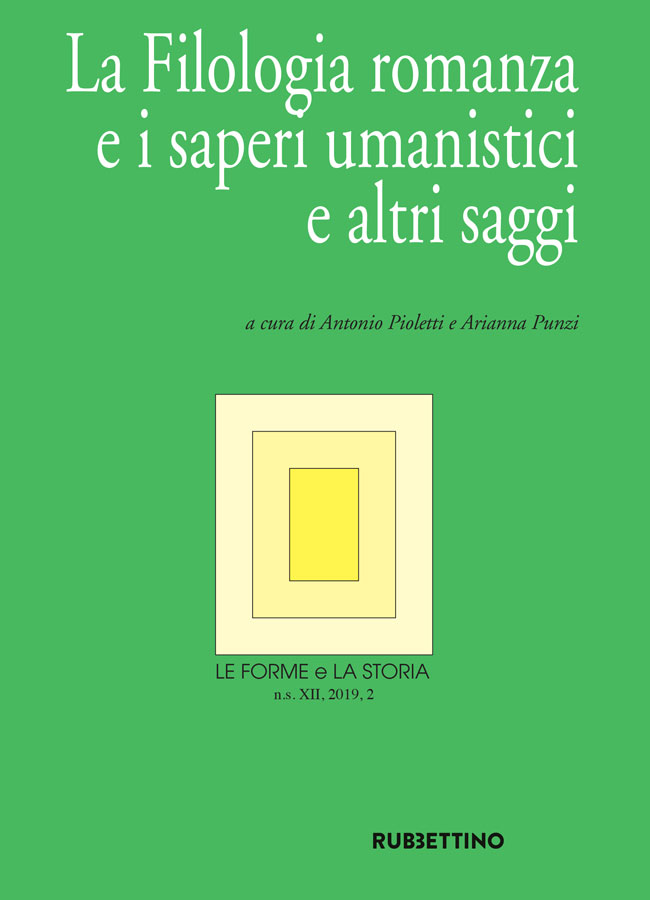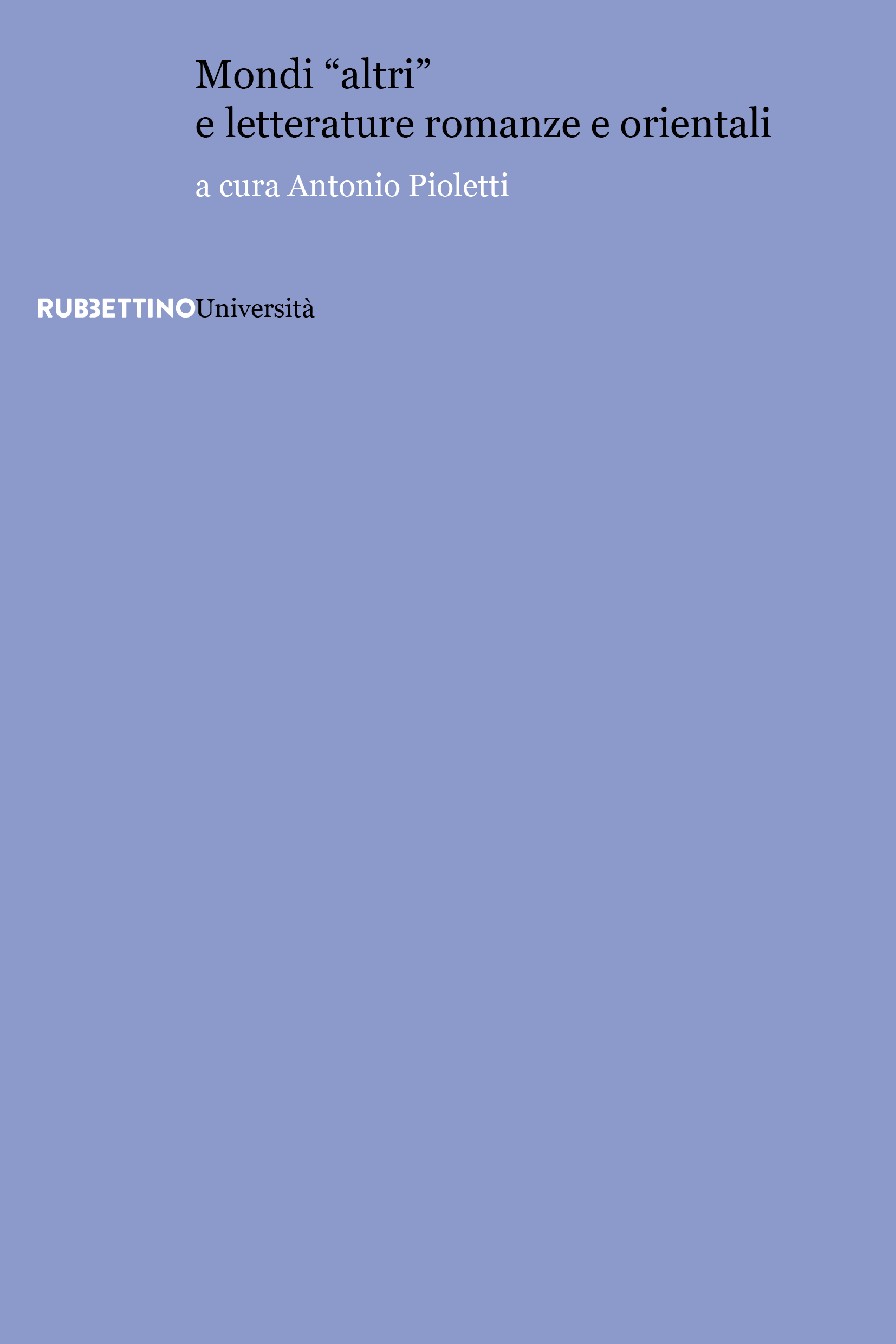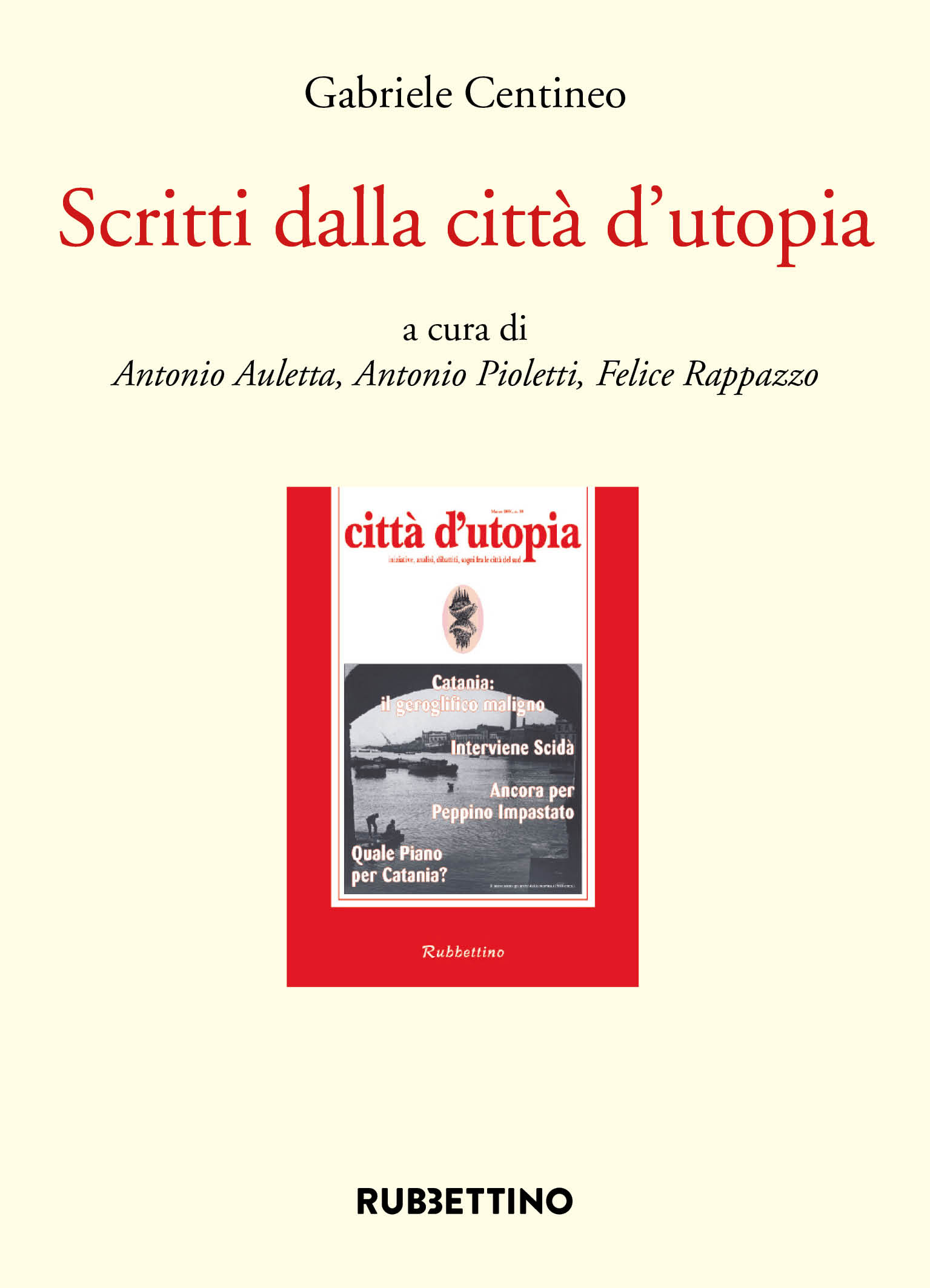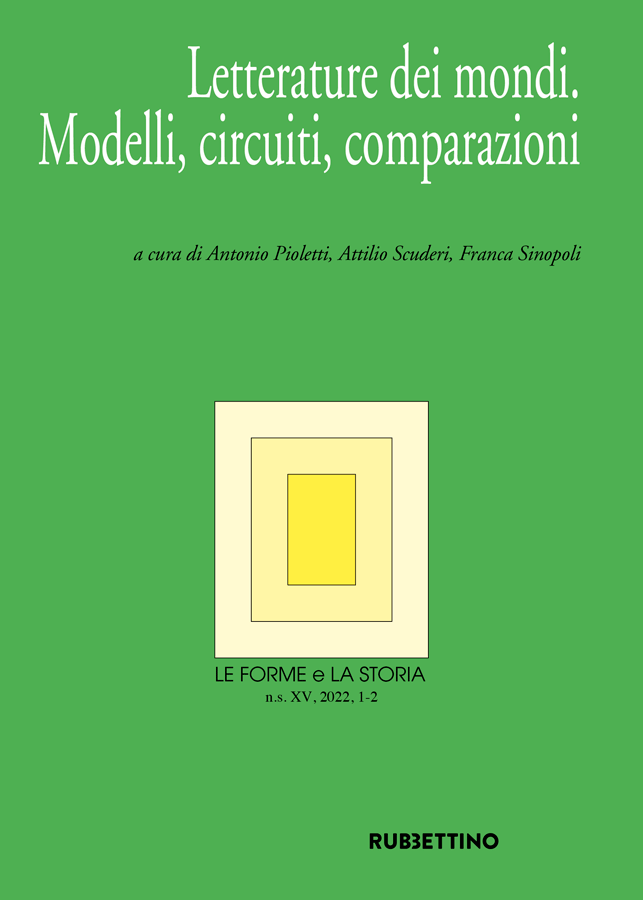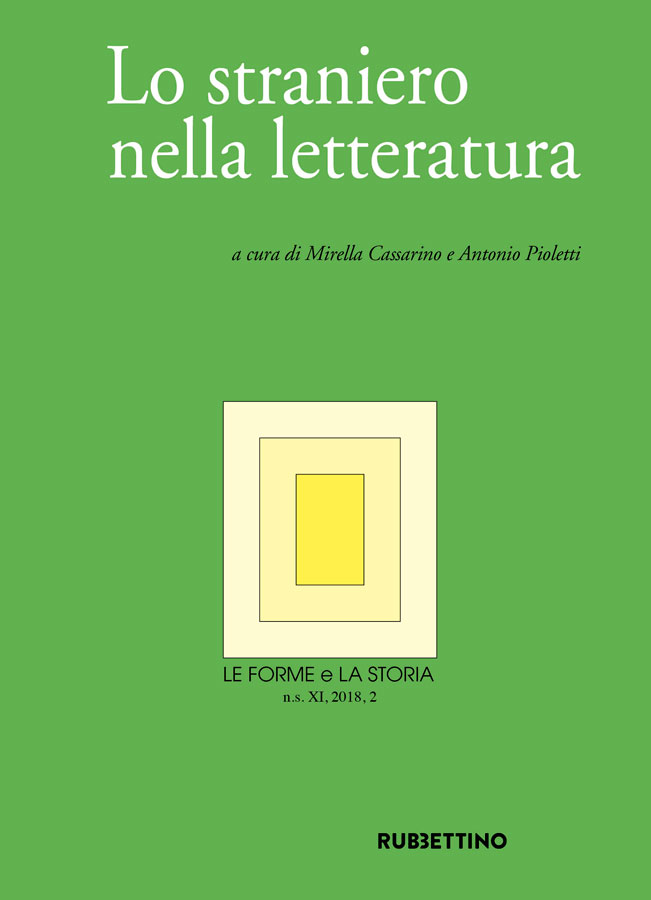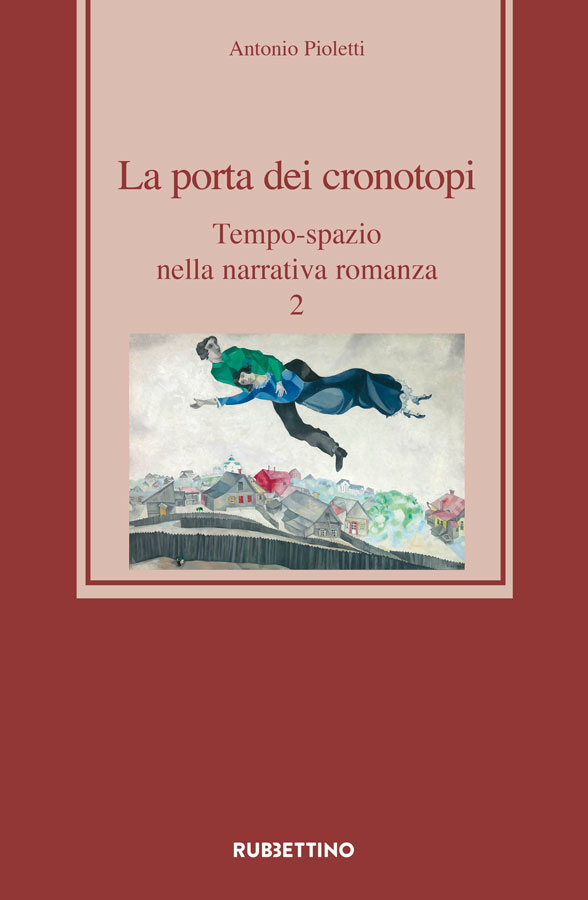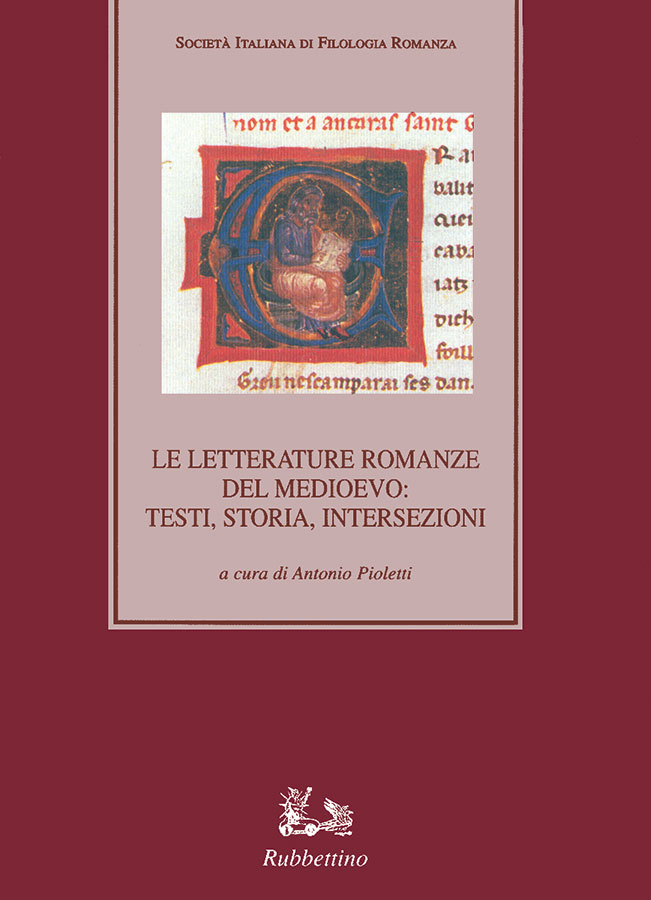Le forme e la storia ns XII, 2019, 2
La Filologia romanza e i saperi umanistici e altri saggi
a cura di Antonio Pioletti e Arianna Punzi
Cartaceo
€14,25 €15,00
Antonio Pioletti – Arianna Punzi
Introduzione – La Filologia romanza e i saperi umanistici
Critica letteraria
Roberto Antonelli
Filologia romanza e saperi umanistici
Filo conduttore del contributo . il tentativo di indicare soluzioni e
Antonio Pioletti – Arianna Punzi
Introduzione – La Filologia romanza e i saperi umanistici
Critica letteraria
Roberto Antonelli
Filologia romanza e saperi umanistici
Filo conduttore del contributo . il tentativo di indicare soluzioni e comunque un percorso per rispondere alla domanda: Come conciliare la funzione critica e una società di massa? Quale ruolo oggi per i saperi umanistici e in particolare per la Filologia romanza e la critica letteraria? L’articolo parte da una pur sintetica ricostruzione delle risposte date da grandi autori (Thomas Mann) e filologi (Spitzer, Auerbach, Curtius), non a caso filologi romanzi, ai temi della Crisi che dalla fine dell’ancien régime caratterizza tutto il XX secolo fino a oggi con il passaggio del sistema culturale e letterario europeo da una dimensione di élite a una di massa. Il concetto di Crisi non va inteso in senso solo negativo, ma comporta anche una ricerca di nuovi spazi critici e nuove metodologie; viene perciò sottolineata la necessità di prendere le mosse sul piano temporale dal nostro tempo-ora, dal Presente, il tempo della Rete, del Web, della globalizzazione, dei mutamenti delle domande dei destinatari e delle offerte della produzione culturale e letteraria; sul piano spaziale si propone di prendere le mosse dalla nostra collocazione geo-culturale, quella europea, di un’Europa aperta chiamata a interrogarsi sul suo ruolo e sul suo futuro. Viene indicato come fondamentale il terreno della funzione formativa e si riflette sull’esperienza dei Corsi di aggiornamento degli insegnanti avviati dalla Fondazione «I Lincei per la scuola», individuando cinque elementi rilevanti emersi da una verifica delle istanze espresse da insegnanti e studenti: l’interesse per il comparativismo, per lo studio dei processi di “lunga durata”, per la centralità del testo, per le connessioni interdisciplinari, per la ricerca di una grammatologia delle emozioni nel fatto letterario.
The underlying theme of the contribution is the question: .How to reconcile the critical function and a mass society?. What role today for Humanities and in particular for Romance Philology and Literary Criticism? The paper starts with a synthetic reconstruction of the answers given by great authors (Thomas Mann) and philologists (Spitzer, Auerbach, Curtius), not by chance Romance philologists, to the themes of the Crisis characterizing the 20th century between the end of the ancien régime and today, when the European cultural and literary system moves from an élite dimension to a mass one. The concept of Crisis is here not negative in itself, but opens to new critical spaces and new methodologies: to start from the present time, the time of the Web, of globalization, of change in demand and supply of cultural and literary production; on the spatial plane the aim is to focus on our geo-cultural location, European, on an open Europe questioning itself about its role and its future. The formative function is fundamental as in the Teacher training courses organized by the I Lincei per la scuola Foundation, identifying five important elements signaled by teachers and students: comparativism, study of the “longue dur.e” processes, centrality of the text, interdisciplinarity, emotions and the literary text.
Gian Mario Anselmi
Da Carducci e De Sanctis al presente della critica
Il saggio si propone di indicare una linea, controversa in passato ma oggi quanto mai indispensabile, tra le origini moderne della critica letteraria italiana con i fondatori Carducci e De Sancts e gli esiti del dibattito critico con temporaneo, in dialogo tra pi. discipline. L’intento . mostrare come la troppo disinvolta liquidazione della linea storica desanctisiana debba oggi essere profondamente rivista: non tanto per resuscitarne tutti gli esiti, quanto per approntare una nuova dinamica che, superando le stagioni del postmodernismo più corrivo, riproponga percorsi atti a ridefinire un quadro ermeneutico volto senza timori al primato del discernimento e della selezione di nuove e più consone cronologie della letteratura e dei vasti campi narrativi ad essa oggi contigui.
The essay proposes to indicate a line, controversial in the past but now more than ever indispensable, between the modern origins of Italian literary criticism with the founders Carducci and De Sanctis and the results of the contemporary critical debate, in dialogue between several disciplines. The intent is to show how the too casual liquidation of the desanctisian historical line must today be profoundly revised: not so much to resurrect all the outcomes as to prepare a new dynamic that, overcoming the seasons of postmodernism more corrective, proposes paths to redefine a framework hermeneutic face without fear to the primacy of discernment and selection of new and more consistent chronologies of literature and of the vast narrative fields contiguous to it today.
Comparatistica
Luciano Formisano
Filologia romanza e comparatistica
La Filologia romanza è per sua natura una disciplina comparatistica e filologica ed è proprio l’aspetto filologico che ne definisce il metodo e gli scopi. Meno cogente appare invece la limitazione tematico-cronologica, fermo restando che la civiltà medievale costituisce il centro naturale e irrinunciabile della disciplina, soprattutto in un periodo in cui si tende a prescindere dalla memoria storica. Egualmente non cogente è la limitazione al settore romanzo quando si considerino i legami, diretti o indiretti, tra civiltà latina e civiltà non romanze e la fecondità delle zone di contatto con l’area germanica, slava e bizantina e con il mondo arabo.
It’s a matter of fact that the philological approach is just what distinguishes the comparativism of Romance philology from other forms of comparativism; from this point of view, the thematic and chronological boundaries seem to be little significative, even though the essential core of the discipline is the study of medieval Romance languages and literatures. As concerns the linguistic boundaries, it is understood that Romance philology has to face the various, sometimes deep forms of contact between the Romance and the Germanic, Slavonic and Byzantine world, not to say of the contacts with the Arabic civilisation.
Massimo Fusillo
Espansioni, irradiazioni, diffrazioni
Il contributo analizza le differenze fra il comparativismo filologico, più orientato allo studio delle fonti e dei contatti diretti, e la situazione della comparatistica attuale, che, in seguito alle forti espansioni di taglio geografico, culturale, e intermediale, appare sempre più aperta, multidirezionale e “rizomatica”, e in grado quindi di dialogare con le trasformazioni dell’immaginario contemporaneo.
The contribution aims at discussing the differences between a philological comparative approach, focused on sources and direct connections, and the more fluid situation of the comparative literature nowadays. After the geographic, cultural and intermedial recent developments, this field appears to be more and more open, multidirectional and “rhizomatic”, and is therefore particularly inclined to deal with the metamorphosis of contemporary imagery.
Federico Condello
Comparativismo selvaggio e classical reception studies. Appunti da un dibattito (per dibattiti a venire)
È legittimo considerare i cosiddetti classical reception studies come un campo di ricerca autonomo, o . pi. opportuno ritenerli un insieme eterogeneo di pratiche scientifiche diverse per origine e natura? Nel tentativo di fornire (provvisorie) risposte a tali quesiti, il contributo passa in rassegna alcuni diffusi elementi di debolezza che talvolta possono inficiare l’approccio dei classical reception studies ai loro oggetti di indagine.
Can the so-called “classical receptions studies” really be considered an independent research field? Or is it more appropriate to consider them a heterogeneous set of scientific practices of various origins and nature? In order to provide some (provisional) answers to these questions, the paper reviews some widespread fallacies that sometimes can weaken the classical reception studies’ approach to their objects of analysis.
Teatro
Luigi Allegri – Giuseppe Noto
Storia del teatro (medievale) e filologia (romanza)
Tra i vari elementi di cui il fenomeno teatrale . sintesi complessa, nella tradizione culturale occidentale (e italiana in particolare) spesso . stato il testo (teatrale, drammaturgico) ad attirare l’attenzione pressoch. esclusiva degli studiosi. Questo ha prodotto in passato il paradosso che a scrivere la storia del teatro siano stati spesso gli storici della letteratura o i filologi, i quali esauriscono nel testo la sola produzione di senso del fenomeno teatrale. Oggi (come ha scritto recentemente Marzia Pieri), .all’idea bizzarra e radicata che il “teatro” […] sia uno scomparto della letteratura si contrappone specularmente la risentita asserzione che le sia totalmente estraneo.. Questo dato, unitamente ad altri di cui si discuter., ha prodotto una frattura tra filologia e storia del teatro che non ha ragione di essere, e che va assolutamente ricomposta.
Among the various elements of which the theatrical phenomenon is a complex synthesis, in the Western (and Italian in particular) cultural tradition it has often been the text (theatrical, dramaturgical) that attracts the almost exclusive attention of scholars. This has produced in the past the paradox that the historians of literature or philologists have often written in the history of the theater, which exhaust only the sense production of the theatrical phenomenon in the text. Today (as Marzia Pieri recently wrote), «all’idea bizzarra e radicata che il “teatro” […] sia uno scomparto della letteratura si contrappone specularmente la risentita asserzione che le sia totalmente estraneo». This datum, together with others that will be discussed, has produced a fracture between philology and the history of theater that has no reason to exist, and which must be completely recomposed.
Filologia e filosofia
Maurizio Ferraris – Lino Leonardi
Fare la verità: filologia e filosofia (e tecnologia)
Dialogo informale tra un filologo e un filosofo, convinti che le due discipline possano condividere un punto di vista comune sulla ricerca della verità.
Informal dialogue between a philologist and a philosopher, agreeing that both disciplines can share a common point of view about the search for truth.
Filologia e storia
Alvaro Barbieri
Medievistica storica e medievistica letteraria: le ragioni della storia negli studi romanzi
Pensando la filologia come una scienza dei testi “nel tempo”, questo lavoro ricapitola i più rilevanti momenti di convergenza tra studi storici e discipline letterarie, con speciale riguardo al dominio geolinguistico romanzo e alla tranche cronologica dell’et. di mezzo. La rassegna dei pi. fruttuosi incontri tra medievistica storica e medievistica letteraria conduce all’enucleazione di quei campi e temi di ricerca entro i quali la mobilitazione sinergica dei due punti di vista appare maggiormente motivata, se non indispensabile. Ne scaturisce un quadro di sintesi che, enfatizzando il momento teorico e metodologico, assegna un ruolo di primo piano agli spessori culturali e al senso di alterità delle letterature medievali.
Considering philology as a science of “texts through time”, the article summarises the most relevant instances of convergence between historical and literary studies, with a special focus on the romance geo-linguistic area and the timespan of the middle ages. The overview of the most fruitful meetings of mediaeval historical and literary studies leads to the isolation of the areas and themes of research within which the synergic employment of the two viewpoints seems to be most strongly motivated, if not necessary. The result is a recapitulating framework, which, by emphasizing the theoretical and methodological aspect, assigns a role of primary importance to the cultural relevance and the sense of alterity of mediaeval literatures.
Filologia e geografia
Eugenio Burgio
Sui rapporti tra Filologia (romanza) e Geografia (appunti per un’approssimazione)
Il saggio svolge alcune riflessioni sui rapporti che i filologi e i linguisti romanzi hanno intrattenuto (e intrattengono) con il sapere geografico tra Otto e Novecento, con particolare attenzione alla situazione creata dallo “Spatial Turn” degli ultimi trent’anni.
The essay carries out some reflections on the relationships that the philologists and linguists active in Romance domains have maintained (and entertain) with the geographic knowledge between the nineteenth and twentieth centuries, with particular attention to the situation created by the “Spatial Turn” in the last thirty years.
Franco Farinelli
La Geografia, la Filologia e il Furioso
Finora nessuno è stato in grado di dare un titolo al libro che, nell’Orlando Furioso, è l’arma più potente del mago Atlante. L’analisi filologica del termine «Copia» nel poema permette di avanzare l’ipotesi che il libro in questione sia la Geografia di Tolomeo. Il che comporta l’inserimento dell’Ariosto nella brillante costellazione di poeti e pensatori (che inizia con Nicola da Cusa e termina con Cervantes) che sulla soglia della modernità affronta il problema di tentare di conciliare la logica cartografica e il mondo-della-vita. E che potremmo comprendere sotto l’etichetta di «nativi cartografici».
Till now nobody was able to detect the title of the book wich, in the Orlando Furioso, is the most powerful weapon of Atlante, the magician. A philological analysis of the word .Copia. permits to advance the hypothesis that this book is the Ptolemy’s Geography. Which means that Ludovico Ariosto is, on the eve of the modern age, a major member of the humanistic galaxy of poets and thinkers (from Nicholas of Cusa to Miguel Cervantes) that we could call the cartographical natives, and whose problem was to reconcile map with life.
Interventi
Antonio Pioletti
Comparativismo filologico, letteratura mondiale e morfologia comparata
Richiamate le motivazioni che hanno ispirato gli Incontri fra filologi romanzi e studiosi di ambiti scientifico-disciplinari affini, l’Autore ricostruisce, dalla fase rinascimentale a oggi, i momenti salienti dell’elaborazione in Europa della categoria di Repubblica delle Lettere. Prende quindi in esame gli interpreti più significativi della World Literature nel Moderno e nel Contemporaneo. Sottopone a critica la visione eurocentrica dei processi della produzione letteraria e quei filoni critici della comparatistica che mostrano di non conferire alla centralità del testo la funzione di punto di partenza ineliminabile per un comparativismo filologicamente fondato.
The author recalls the reasons behind the inspiration for the Incontri [Meetings] between romance philologists and scholars from akin scientificdisciplinary sectors and then reconstructs, from the Renaissance phase to the present day, the salient moments of the working out in Europe of the category of the Republic of Letters. He then examines the most significant interpreters of World Literature in the Modern and the Contemporary. He applies a critical approach to the Eurocentric vision of processes of literary production together with those critical currents of comparativist studies that manifestly do not grant the function of undeniable point of departure to the centrality of the text for a philologically founded comparatism.
Massimo Bonafin
Categorie antropologiche e studi filologico-letterari: un percorso critico (con l’esempio di Q478.1. The Eaten Heart)
L’articolo propone un approccio alla letteratura medievale in cui i metodi filologici si combinano con categorie antropologico-culturali; il rendimento di una simile prospettiva ibrida . verificato nell’analisi del motivo del cuore mangiato. Il motivo Q 478.1 dell’indice di Thompson si rivela prezioso per l’analisi comparativa dei testi perch. aiuta a spiegare la fascinazione ricorrente di questo intreccio e la sua valenza mitico-narrativa.
The article proposes an approach to medieval literature in which philological methods are combined with anthropological-cultural categories; the performance of such a hybrid perspective is verified in the analysis of the motif of the eaten heart. The Q 478.1 motif of Thompson’s index is valuable for the comparative analysis of texts because it helps to explain the recurrent fascination of this plot and its mythical-narrative value.
Paolo Maninchedda
La filologia come critica del discorso e della libertà
La Filologia è tradizionalmente insegnata e percepita come una disciplina ricostruttiva, orientata di necessità verso il passato e inagibile per il presente. Invece l’attualità, sempre pi. costituita da narrazioni pi. che da eventi, ha un estremo bisogno di conoscenze e competenze filologiche, soprattutto per tutelare i fondamenti stessi dell’esercizio pieno e consapevole della libertà, in un mondo globalizzato nel quale la colonizzazione ideologica delle masse. operata non solo e non tanto attraverso nuovi e potenti strumenti tecnologici, ma soprattutto attraverso grandi manipolazioni narrative non ostacolate da un adeguato sapere critico.
Philology is traditionally taught and perceived as a reconstructive discipline, oriented towards the past and unsuitable for the present. Instead actuality, increasingly constituted by narrations rather than events, have an extreme need for philological knowledge and skills, above all to protect the very foundations of full and conscious exercise of freedom, in a globalized world in which ideological colonization of the masses is made not only and not so much through new and powerful technological tools, but above all through great narrative manipulations not hindered by an adequate critical knowledge.
Altri saggi
Sana M’selmi
L’animal, cette «inquiétante étrangité». Portraits de l’homme à bout
Que provoque l’irruption de l’animal dans la vie des personnages de Rachid Boudjedra (L’Escargot entêté) et de Patrick Süskind (Le Pigeon) et dans le texte ? De quelle mani.re les .crivains explorent-ils la symbolique animale en vue de montrer la transformation du rapport au r.el et de sa perception par les personnages ? De quelle mani.re l’humain interagit avec l’animal : pourquoi l’apparition de l’animal sonne-t-elle le glas de l’ordre et de l’.quilibre psychique de ces derniers ? Quelle lecture du r.el et de l’histoire, les auteurs proposent-ils . travers le spectre de l’animal ? What does intrusion of the animal causes into the lives of the characters of Rachid Boudjedra’s novel L’Escargot entêté and Patrick Süskind’s Le Pigeon and into the text? In which way do writers explore animal symbolism in order to show the transformation of the relationship to reality and its perception by characters? In which way does the human interacts with the animal: why does the irruption of the animal marks the end of the order and psychological balance of the formers? What is the reading of reality and history do the authors propose through the spectrum of the animal?
Jumana Bayeh
Identity, Narrative and the Arab-American Diaspora
Transformations of identity, religious, ethnic or national, lie at the heart of migration and diasporic experience. This is also true of the experience of the Arab diaspora located in America. This diaspora is often designated as “Arab-American” signifying not just a hyphenated identity but also an ambivalent transformation that is located between the new place of settlement and the homeland. Occupying a liminal space, the Arab diaspora presents challenges to fixed or unitary notions of national or ethnic identity, exposing unique ways that national and ethnic identity are altered in diaspora. Studies of Middle Eastern migrant communities, particularly from the social sciences, reveal that migrant subjects recount their experiences of migration and their subsequent identity transformations in the form of personal stories. Narrative, whether written or oral, is, therefore, a powerful medium that allows migrants to convey how their subjectivity has been reshaped through processes of mobility and resettlement. This article explores the centrality of narrative to this project, and does so by drawing on the work of Arab-American authors like Diana Abu-Jaber, Mohja Kahf and Alia Yunis. It focuses on the various ways diaspora scholarship has contributed to thinking about identity in a context of migration and movement, as well as the issues that preoccupy Arab migrant writers, to highlight how identity, in its various forms and guises, is both formed and transformed in the diasporic space of America.
